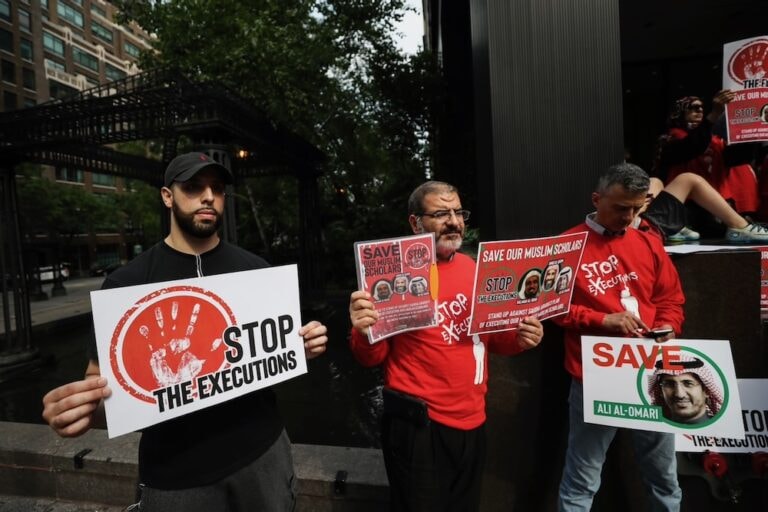Four Saudi activists are under investigation after forming a human rights group on April 3, 2013, and could face prosecution for “establishing an illegal organization".
Four Saudi activists are under investigation after forming a human rights group on April 3, 2013, and could face prosecution for “establishing an illegal organization,” Human Rights Watch said today. Saudi authorities should immediately cease harassing the four founding members of the group, the Union for Human Rights (UHR), and give it an operating license, Human Rights Watch said.
The Riyadh public prosecutor summoned Mohammed Abdullah al-Otaibi and the UHR’s three other founding members for questioning on April 28, April 29, and May 4. Al-Otaibi told Human Rights Watch that after the members agreed to close down the group, the authorities said they would not bring charges if the UHR applied for an official license and suspended operations until the Social Affairs Ministry granted it. On May 6, however, prosecutors summoned al-Otaibi for further questioning on May 8, raising fears that they will in fact press charges against the four founders.
“Yet again, Saudi authorities are threatening with long prison terms those who dare to speak out in favor of human rights reforms,” said Sarah Leah Whitson, Middle East director at Human Rights Watch. “How can establishing a human rights organization be a crime? The Saudi authorities should be welcoming such initiatives, not quashing them.”
One of the founding members told Human Rights Watch that the investigators accused them of setting up an unlicensed organization and told them to close it down immediately or face prosecution. Saudi Arabia has no law on associations or any regulation that specifically criminalizes the establishment of nongovernmental organizations, Human Rights Watch said.
The founding member said that he had approached the Social Affairs Ministry in late March to seek an operating license for the organization but that the ministry failed to respond.
During the May 4 interrogation session, investigators accused al-Otaibi and another co-founder of creating an illegal organization and demanded to know who had conceived it, who issued its media statements, and who financed the group. Investigators also accused them of publishing false information about an Eritrean air force fighter pilot who defected and flew his plane to Saudi Arabia in April although the members said their information had come entirely from the reporting of Saudi pro-government media.
The organization’s mission statement, published on April 3, proclaims that the new organization will promote a culture of human rights in Saudi Arabia and will defend and assist other human rights groups. It states also that the group will campaign to end the death penalty and seek to strengthen the role of women in Saudi society. One of the founders told Human Rights Watch that he and the others had long considered starting a human rights organization but felt spurred to do so by the Saudi government’s decision to close down another group, the Saudi Association on Civil and Political Rights (ACPRA), in March and its detention of seven of the group’s members.
UHR published several statements in the weeks after its formation. In one, it called on the government to disclose information about Mohammed al-Bajadi, one of the imprisoned ACPRA members. The authorities have denied all access to him since September 19, 2012, causing concern for his well-being in prison. In another statement, UHR urged the government to provide adequate medical care to another imprisoned member of the group, Abdullah al-Hamid, who suffers from diabetes and a tumor on his neck.
The four founders of the UHR – Mohammed Abdullah al-Otaibi, Mohammed `Ayedh al-Otaibi, Abdullah Faisal Badrani, and Abdullah `Atawi – all have a history of activism and protest. In 2009, the authorities arrested Mohammed Abdullah al-Otaibi for protesting the Israeli military invasion of Gaza and sentenced him to three years in prison. `Atawi, an environmental activist, spent time in prison for protesting the US-led invasion of Iraq in 2003. Badrani is a former agent in the Saudi security services anti-terrorism unit who became disillusioned by abuses by the security services that he witnessed and decided to devote himself to human rights activity.
The harassment of the group’s founders follows a recent government crackdown on human rights and civil society activists and the closure of ACPRA and jailing of its leaders. In March, a court sentenced Mohammed al-Qahtani and al-Hamid, ACPRA’s two co-founders, to 10-year and 11-year prison terms respectively after convicting them of “destabilizing security by calling for protests,” “spreading false information to outside sources,” “undermining national unity,” and “setting up an illegal human rights organization.”
The Arab Charter on Human Rights, to which Saudi Arabia is a state party, guarantees the right “to freely form and join associations with others” under article 24. Saudi Arabia has no law on associations or criminal code that bars the establishment of associations, but authorities regularly shut down organizations that do not receive operating licenses from the Ministry of Social Affairs.
“Soon after suppressing the ACPRA, the Saudi authorities started harassing the Union for Human Rights and its founders only weeks after they began operations,” Whitson said. “The Saudi authorities are like the leopard who could not change his spots when it comes to allowing free speech and human rights groups.”


